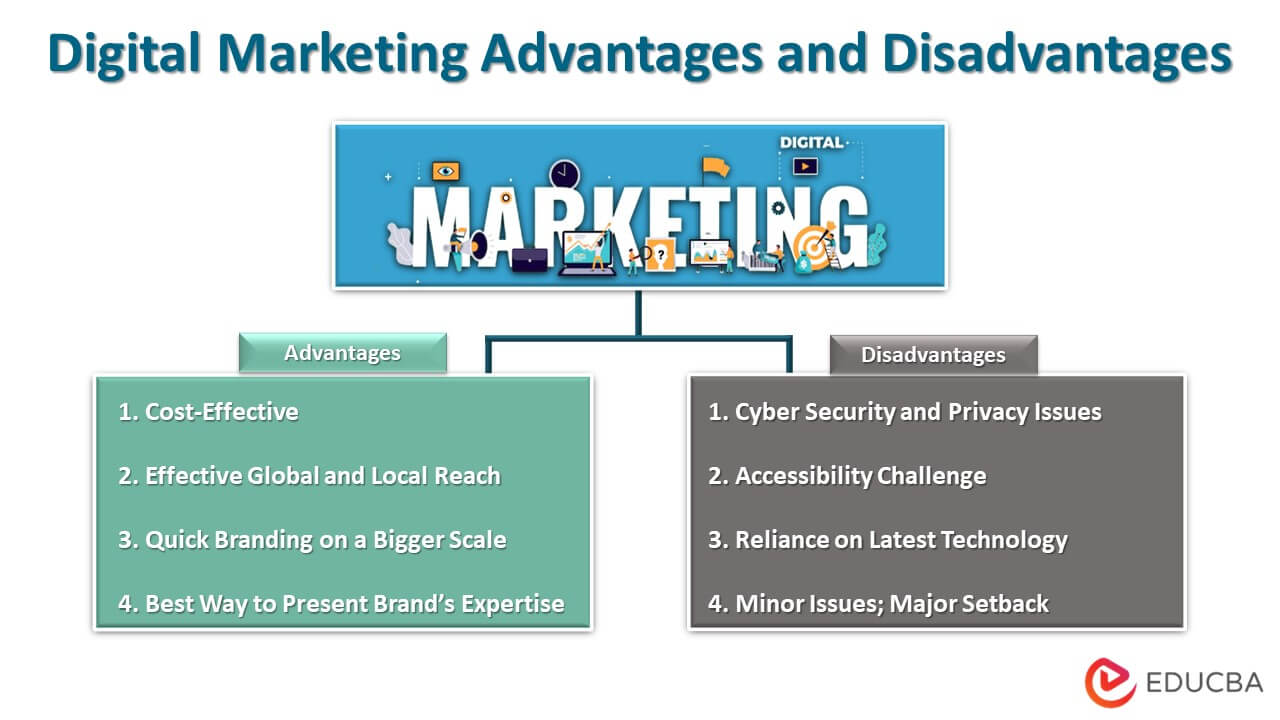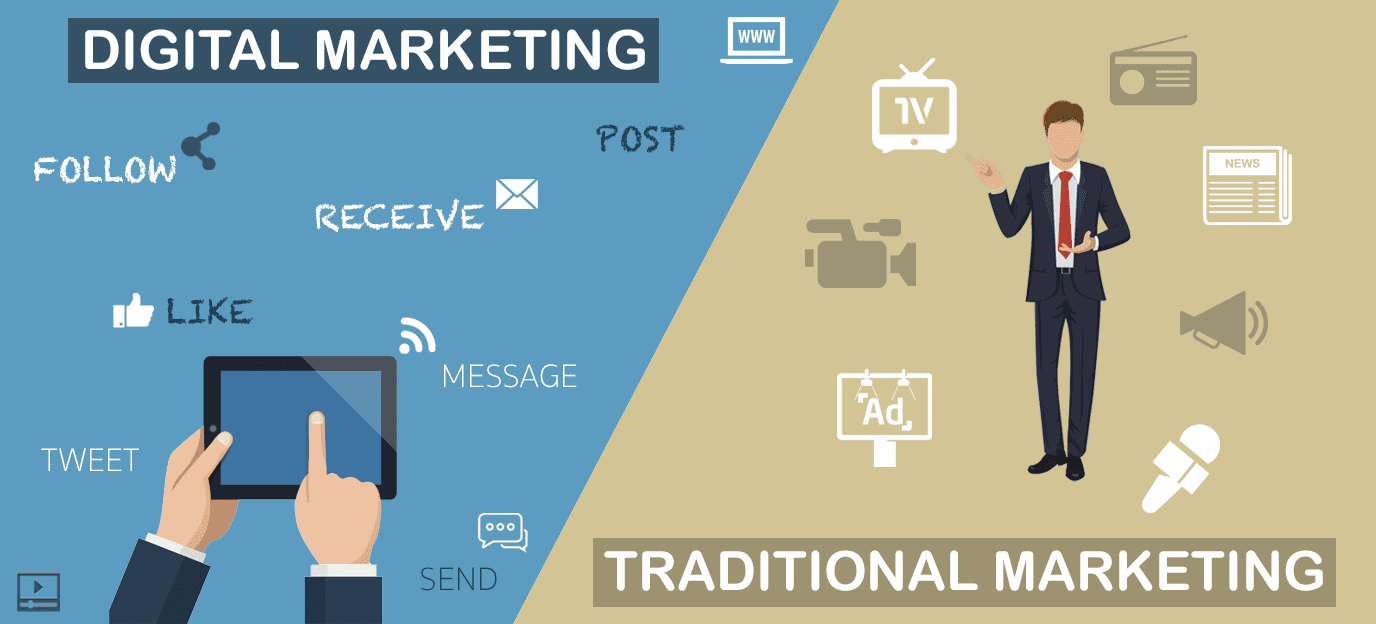Digital marketing offers wide reach and cost-effectiveness, yet it also presents challenges with competition and data privacy. The pros of digital marketing include targeting precision and measurable results; the cons involve intense competition and potential security issues.
Navigating the digital marketing landscape calls for a strategic approach to harness its full potential while mitigating risks. Businesses today are turning to online platforms to promote their services and products, utilizing tools like SEO, social media, and email campaigns to connect with a global audience.
This method of marketing allows for real-time customer feedback and analytics, providing key insights into consumer behavior. With digital marketing, companies can craft personalized experiences, heighten brand awareness, and generate leads more efficiently than traditional marketing channels permit. Still, the digital space is saturated, and standing out requires constant innovation. Additionally, safeguarding consumer data against breaches is paramount to maintain trust and comply with evolving regulations. A thoughtful balance of these factors can propel a business forward in today’s digitally-centric marketplace.
The Digital Marketing Revolution
The world of advertising has undergone a seismic shift with the advent of digital marketing. Beyond mere online presence, businesses are leveraging digital strategies to connect with audiences in unprecedented ways. This transformation brings both exciting opportunities and unique challenges.
A Shift From Traditional Methods
Digital marketing ditched old-school print and broadcast techniques. It waved goodbye to costly ads in favor of cost-effective digital solutions. We now reach thousands online instantly, tracking every click and engagement.
- Reaches wider audiences at a fraction of traditional costs.
- Offers precise targeting based on user data.
- Enables real-time performance analysis and strategy tweaks.
Yet, the shift is not without drawbacks. Exposure to ad-blockers and developing content that cuts through the digital noise can be challenging.
Rising competition online can make standing out tough.
The Rise Of Engagement Through Technology
Digital platforms have transformed how brands interact with consumers. Interactive campaigns and personalized messaging make experiences more engaging.
- Utilizes social media, email, and SEO for direct conversations.
- Employs advanced analytics to understand consumer behavior.
- Grows customer loyalty through tailored content.
Despite this, technology can be a double-edged sword. Balancing personalization with privacy concerns is essential. Moreover, keeping up with fast-changing technologies requires constant adaptation.
| Pros | Cons |
|---|---|
| Enhanced customer interaction | Complexity in managing data privacy |
| Real-time feedback and analytics | Need for ongoing tech updates |
| Personalized consumer experiences | Potential for consumer overwhelm due to content saturation |
In essence, the digital era empowers brands to create intimate bonds with their audiences. Yet, brands must navigate tech nuances carefully to win consumer trust and loyalty.

Credit: www.linkedin.com
Advantages Of Digital Marketing
Digital marketing has changed how businesses connect with customers. It offers unbeatable advantages. Let’s explore these benefits in more detail.
Cost Efficiency And Budget Flexibility
Cost efficiency is a top advantage of digital marketing. Traditional methods can be costly and hard to track. Small businesses now compete with big names without spending a fortune. They do this by cleverly using digital platforms. Budgets stretch further online. Companies choose exactly where and how to spend. This could be on social media, search engines, or other digital channels.
Marketing strategies adapt as needed. Real-time adjustments are possible. Budgets go up or down based on what works. This ensures every penny counts.
Analytics And Optimization Opportunities
Understanding customer behavior is easier with digital marketing analytics. Businesses track campaigns in real-time. They see what’s working and what’s not. This quick feedback leads to better decisions.
Access to detailed analytics guides optimization. Companies test different messages, formats, and strategies. They refine campaigns for the best results. Performance is clear and measurable.
Broader Audience Reach
Digital marketing breaks physical barriers. Reach goes beyond local neighborhoods. Worldwide audiences are now accessible. The internet does not close. It’s open day and night.
A London-based store can sell to customers in Tokyo. A local blog can gain readers from across the globe. A social media ad can go viral, reaching millions.
- Targeted campaigns connect with the right people.
- Social media influencers expand that reach even further.
- Content transcends borders, finding niche audiences worldwide.
Challenges In The Digital Realm
The digital world offers endless opportunities for businesses. Yet, it also presents unique challenges. To stay ahead, understanding and tackling these obstacles is key. Let’s dive into the key issues marketers face in the online landscape.
Intense Competition Online
The internet is a bustling marketplace with countless businesses vying for attention. Standing out in such a crowded space requires creativity and strategic planning. The battle for visibility means marketers must be adept at differentiating their brand.
Key points include:
- Search Engine Optimization (SEO): A must for higher rankings.
- Content Quality: Engaging, original content is vital.
- Ad Strategies: Smart, targeted ads can boost presence.
Security And Privacy Concerns
Data breaches and privacy issues can tarnish a brand’s reputation. A strong focus on digital security is crucial. Protection measures and adherence to regulations like the GDPR are imperative for trust.
Businesses must:
- Implement robust cybersecurity measures.
- Ensure compliance with data protection laws.
- Regularly update privacy policies.
Transparency with customers about data use is also paramount.
Rapid Changes And The Need For Agility
Digital marketing is ever-evolving. Staying current with trends and technology is non-negotiable. Quick adaptation helps capitalize on new opportunities and avoids being left behind.
Essential strategies include:
| Strategy | Benefit |
|---|---|
| Continuous Learning | Keeps skills sharp |
| Flexibility in Planning | Allows rapid response |
| A/B Testing | Refines marketing tactics |
Embracing change leads to innovation and growth.

Credit: www.educba.com
Impact On Consumer Behavior
The digital age has transformed how consumers interact with brands and make purchasing decisions. Understanding this ‘Impact on Consumer Behavior’ is crucial for businesses looking to thrive in the ever-evolving online landscape. Let’s delve into the nuances of this impact and explore the pros and cons that digital marketing introduces.
Enhanced Customer Interaction
Digital marketing has revolutionized customer engagement. Brands can now communicate instantly with their audience through social media, email, and live chats. This real-time interaction boosts customer satisfaction and loyalty.
- Pros: Customers enjoy personalized experiences. Businesses gather valuable feedback quickly.
- Cons: Constant engagement can sometimes feel overwhelming for customers. It demands more resources from businesses.
Shift In Purchasing Decisions
Consumers no longer follow a straightforward path to purchasing. Digital marketing efforts like targeted ads and online reviews heavily influence their choices. The abundance of information leads to more informed decisions.
| Pros | Cons |
|---|---|
| Access to reviews and product comparisons aid informed decision-making. | Overload of options can lead to indecision or choice paralysis. |
| Personalized marketing aligns with individual preferences, increasing conversion rates. | Consumers may become skeptical of marketing tactics, risking brand trust. |
Striking The Balance
Striking the balance in digital marketing means harmonizing online efforts with offline endeavors. In today’s fast-paced digital world, businesses must blend technology with traditional tactics. This ensures a comprehensive approach to reach diverse audiences. By doing so, companies create a consistent brand experience across all platforms.
Integrating Digital With Traditional Marketing
Combining old and new marketing strategies can be challenging but rewarding. Traditional methods like print ads, billboards, and TV commercials have distinct advantages. These include tangible materials and a history of effectiveness. Digital marketing offers precision targeting and data-driven insights. Crafting a well-rounded campaign involves using each method’s strengths.
- Print and Online Ads: Pair newspaper ads with social media campaigns to boost visibility.
- TV and Video Marketing: Align TV spots with YouTube ads for a broader reach.
- Direct Mail and Email: Combine flyers with email newsletters to cover different demographics.
Building Sustainable Digital Marketing Strategies
Creating a sustainable digital marketing plan means thinking long-term. It’s crucial to design campaigns that evolve with market trends but remain true to your brand. Here’s how to do it:
| Strategy Component | Sustainable Approach |
|---|---|
| Content Creation | Produce evergreen content that stays relevant. |
| SEO | Focus on long-term keyword trends and updates. |
| Data Analysis | Regularly review metrics to adapt strategies. |
| Community Building | Engage audiences through meaningful interactions. |

Credit: tedigitalmarketing.com
Frequently Asked Questions Of Pros And Cons Of Digital Marketing
What Is Digital Marketing?
Digital marketing refers to advertising delivered through digital channels such as search engines, websites, social media, email, and mobile apps. It encompasses a wide range of marketing strategies and campaigns.
What Are The Benefits Of Digital Marketing?
Digital marketing offers benefits including global reach, lower cost, trackable and measurable results, personalization, and improved conversion rates. It enables targeting ideal audiences more precisely.
What Are Digital Marketing Challenges?
Challenges in digital marketing include intense competition, constantly evolving digital platforms, a need for skilled personnel, and maintaining customer privacy and data security.
How Cost-effective Is Digital Marketing?
Digital marketing is generally more cost-effective than traditional marketing, with options like pay-per-click and social media enabling budget-friendly strategies for businesses of all sizes.
Conclusion
Navigating the digital marketing landscape presents unique challenges and opportunities alike. Harnessing its power can propel businesses forward, while ignoring its pitfalls may lead to setbacks. It’s about striking a balance—leveraging the reach and precision of online platforms without overlooking the importance of genuine connection and adaptability to change.
As we embrace this dynamic field, making informed decisions becomes our compass to success.








